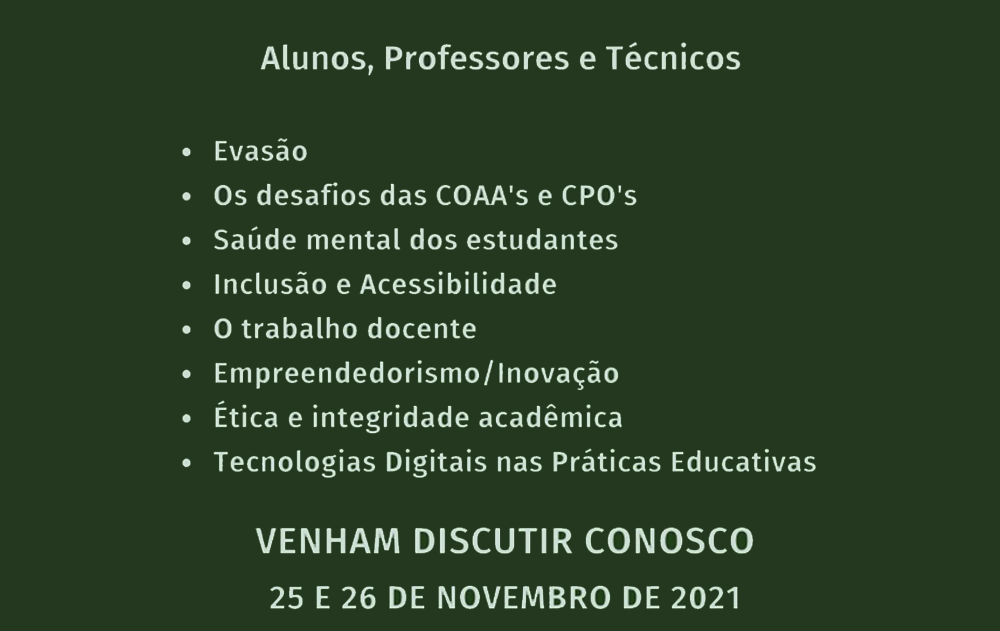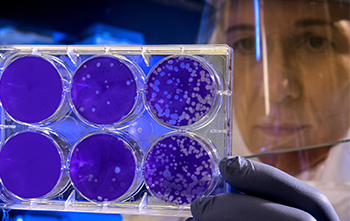Bachelor's Degree in Biological Sciences: Microbiology and Immunology
In response to national demand, the IMPG implemented, in 1994, the first four-year (8-period) undergraduate course in Microbiology and Immunology in Brazil. The National Education Council recognized this course as A-grade (Portaria 57 of 01/13/2000, published in the Federal Official Gazette on January 14, 2000).
This course, which confirms the pioneering spirit of the Institution, has gradualed not only highly qualified professionals in areas of strategic interest, such as Environmental Microbiology, Quality Control and many others, but also has been preparing students for the immediate admission to Post-Graduation courses, motivating the effective participation of these young people into the Brazilian scientific scenario. In December 2007, the baccalaureate received the highest recognition by the Ministry of Education (MEC), and was evaluated as grade 5 (five). In 2013, the course was redesigned for the first time, in order to incorporate the latest knowledge and techniques available in the dynamic field of Biological Sciences. The course today consists of 30 mandatory subjects, 6 Supplementary Curricular Requirements for Mandatory Supervised Internships (including Course Conclusion Projects (TCC Project)), 320 hours of optional academic activities of the Extension group, 50 hours of optional academic activities from the group of Complementary Activities, 120 hours of chosen elective subjects and 60 hours of required elective subjects distributed over 8 academic periods (4 years) that are full-time (morning and afternoon), with a total workload of 3,540 hours corresponding to 141 credits.
The curriculum is organized in such a way as to integrate the basic sciences and the specific sciences of the profession; thereby awakening in the students, as of their first period, an interest in learning, development of logical and critical reasoning and scientific thought by putting them into contact with the tools for Bibliographic research and scientific information. To lead the student to the development of these activities the course presents a differential of 1,760 hours which are directed to laboratory activities including practical classes, internships and the development of a monograph to be presented at the end of the course.
This curriculum addresses the basic subjects of an undergraduate course in Biological Sciences; it introduces the microorganism-host relationship; health/disease relations are discussed when the different etiological agents (viruses, bacteria, fungi and protozoa) of infections in living beings as well as their laboratory diagnosis are studied; the immunology and immunopathology involved in these processes are also studied; it also focuses on the study of Environmental Microbiology, covering ecology, biodiversity and pollution; it introduces Industrial Microbiology and, in the last two periods, the student dedicates himself to the experimental works for the monograph that is presented in the last period.
Coordination
Undergraduate Coordinator: Lígia Maria Torres Peçanha
E-mail: lpacanha@micro.ufrj.br
Vice-Coordinator of Undergraduate program: Maria Teresa Villela Romanos.
E-mail: teresa.romanos@micro.ufrj.br
Secretaries: Vânia Queiroz, Maria Leonisa Sanchez and André Luís Amandula Leal
E-mail: graduacao@micro.ufrj.br / leonisa@micro.ufrj.br /
andreamandula@micro.ufrj.br
Phone: +55 21 3938-6735
In response to national demand, the IMPG implemented, in 1994, the first four-year (8-period) undergraduate course in Microbiology and Immunology in Brazil. The National Education Council recognized this course as A-grade (Portaria 57 of 01/13/2000, published in the Federal Official Gazette on January 14, 2000). This course, which confirms the pioneering spirit of the Institution, has gradualed not only highly qualified professionals in areas of strategic interest, such as Environmental Microbiology, Quality Control and many others, but also has been preparing students for the immediate admission to Post-Graduation courses, motivating the effective participation of these young people into the Brazilian scientific scenario. In December 2007, the baccalaureate received the highest recognition by the Ministry of Education (MEC), and was evaluated as grade 5 (five). In 2013, the course was redesigned for the first time, in order to incorporate the latest knowledge and techniques available in the dynamic field of Biological Sciences. The course today consists of 30 mandatory subjects, 6 Supplementary Curricular Requirements for Mandatory Supervised Internships (including Course Conclusion Projects (TCC Project)), 320 hours of optional academic activities of the Extension group, 50 hours of optional academic activities from the group of Complementary Activities, 120 hours of chosen elective subjects and 60 hours of required elective subjects distributed over 8 academic periods (4 years) that are full-time (morning and afternoon), with a total workload of 3,540 hours corresponding to 141 credits.
The curriculum is organized in such a way as to integrate the basic sciences and the specific sciences of the profession; thereby awakening in the students, as of their first period, an interest in learning, development of logical and critical reasoning and scientific thought by putting them into contact with the tools for Bibliographic research and scientific information. To lead the student to the development of these activities the course presents a differential of 1,760 hours which are directed to laboratory activities including practical classes, internships and the development of a monograph to be presented at the end of the course.
This curriculum addresses the basic subjects of an undergraduate course in Biological Sciences; it introduces the microorganism-host relationship; health/disease relations are discussed when the different etiological agents (viruses, bacteria, fungi and protozoa) of infections in living beings as well as their laboratory diagnosis are studied; the immunology and immunopathology involved in these processes are also studied; it also focuses on the study of Environmental Microbiology, covering ecology, biodiversity and pollution; it introduces Industrial Microbiology and, in the last two periods, the student dedicates himself to the experimental works for the monograph that is presented in the last period.
Coordination
Undergraduate Coordinator: Lígia Maria Torres Peçanha
E-mail: lpacanha@micro.ufrj.br
Vice-Coordinator of Undergraduate program: Maria Teresa Villela Romanos.
E-mail: teresa.romanos@micro.ufrj.br
Secretaries: Vânia Queiroz, Maria Leonisa Sanchez and André Luís Amandula Leal
E-mail: graduacao@micro.ufrj.br / leonisa@micro.ufrj.br /
andreamandula@micro.ufrj.br Phone: 3938-6735



















